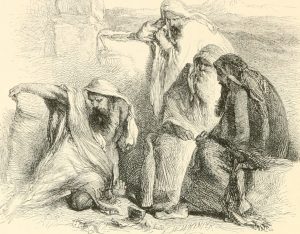
WE SEE the divine council worldview in the ongoing discourse of Eliphaz the Temanite, as he mentions the “Holy Ones,” an epithet used elsewhere in the Old Testament for the Watchers (Daniel 4:13, 17).
We also discuss the hidden meaning of the “sparks” in Job 5:7, the bene resheph or “sons of Resheph,” and the significance of the Canaanite plague-god Resheph (hint: Resheph was called Apollo by the Greeks and Romans).
Question: Which god did Eliphaz serve? Was he a pagan? We assume it was the God of Abraham, Isaac, and Jacob, but Job lived between the time of Noah and the birth of Abraham and God had not yet revealed His name to humanity. That happened hundreds of years later with Moses on Mount Sinai (Exodus 6:3).
So, assuming Eliphaz served the same God as Job, he would probably have known Yahweh as El Shaddai, a theory supported by Eliphaz’ reference to “the Almighty” (shadday) in Job 5:17.
We also discuss other nouns such as “affliction,” “trouble,” “injustice,” “destruction,” and “famine,” because those were often considered to be demonic entities in the ancient Near East. This is a great exercise in trying to get inside the head of someone who lived more than four thousand years ago on the other side of the world, although admittedly somewhat speculative.
The takeaway: Eliphaz rebuked Job for blaming God for his troubles, which Eliphaz appears to think are Job’s fault for being insufficiently devout.
Click here for the complete archive of our New Testament Bible studies to date, and click here for the Old Testament studies to date. Or go to www.spreaker.com/show/gilbert-house-fellowship for all of the audio.

Perry Stone commentary on Job 5:5: Farmers commonly placed the grain and chaff underneath piles of thorn bushes at night, so the thorns would serve as a natural hedges of protection around the grain in case thieves tried to steal it or animals tried to eat it.
Job 5:17-18 is similar to the reference in Hebrews 12:5-7 where God chastens us and afterward heals us and binds up our wounds.
Eliphaz”s prediction that Job would live longer came true because he lived 140 years more (see Job 42:16) So although Eliphaz was wrong about why Job suffered, he was right about this part!
Hello, Sharon mentioned “Elija” along with a comment on how she memorizes scripture. I am wondering if this is an app or a tool one can use to expedite learning/retention? Please advise. Thank you. Christine
Hi, Christine: “Elijah” is an oratorio by Felix Mendelssohn. You can probably find recordings at Amazon Music, Pandora, or Spotify.
Thank you so much for your prompt reply. Ps. I listen to you and your wife often. I have learned so much through you both and have gained a new and profound appreciation for what takes place when one slows down and takes the time to walk slowly through The Word of God. God Bless you, Derek and Sharon.